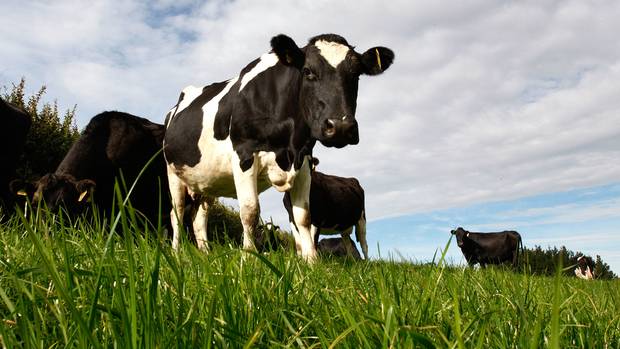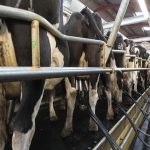
Given the aspirations we have to transform and diversify the economy, that’s almost a bit disappointing.
But right now I’ll take it – and so should the Government.
Next week’s GDP growth figure is likely to be pretty subdued – economists are picking 0.3 per cent to 0.5 per cent for the quarter. That could see annual growth as low as 2.5 per cent.
Hopefully that’s the lowest we see for a while.
Global dairy prices have bounced up from a cyclical low in November. After the latest global dairy auction they are broadly up about 23 per cent.
That’s a relief because however gloomy business confidence might be in downtown Auckland, it’s hard to see GDP growth dipping too much with a Fonterra dairy payout closing in on $7/per kg of milk solids.
As ANZ’s commodity index shows, beef, lamb, kiwifruit and logs are all in pretty good shape.
While nothing is quite booming yet, it is a relatively rare alignment of solid pricing and should eventually provide a solid base for domestic activity.
We all know and understand the need to diversify New Zealand’s economic base.
Things could be better, we could and should invest more in R&D.
We need more tech companies, we need to move our agricultural exports up the value chain.
As I noted last year, our slide down the rankings in the Global Innovation Index is cause for concern.
Back in 2012 we ranked as the 13th most innovative economy in the world.
In the 2018 survey (just released) we rank 22nd – down from 21st in 2017.
In terms of earnings, the tech sector has made good progress in the last decade, growing revenue about 10 per cent each year.
But now and for the foreseeable future, the nation’s fortunes remain tethered to the rural economy.
According to the Minister of Primary Industries, the agricultural sector earned about $43 billion for the country last year.
New Zealand’s grand total of export earnings (including tourism) was $82.3 billion last year.
Dairy commodities alone earned $14.4b in the year to January 2019. Which is about 17 per cent of all the nation’s earnings.
That figure was about 20 per cent 15 years ago when I was covering the sector on my daily beat.
There has not really been much of a shift and you can bet that most of the percentage change comes from a rise in the relative value of tourism earnings.
International tourism expenditure is worth about $16.2 billion.
In short, we remain highly reliant on farming.
Meanwhile, the domestic economy has been slowing as property prices ease but it’s certainly not going off a cliff.
Most economists expect it will get a boost from increased Government spending flowing through this year.
But business confidence remains very low, costs are rising and margins are still being squeezed by deflationary pressure.
As Auckland Council economist David Norman points out, Auckland’s economy is also still underpinned by a record construction boom.
Buildings consented are up 25 per cent in the past year.
Commercial building saw a 42 per cent increase in consented floor space in the past year.
Both are up off an already historically high base.
Call me a pessimist, but that it’s so high it’s giving me vertigo.
I can’t recall a time when Auckland came off a construction boom in an orderly fashion.
Property prices don’t need to sink by as much as they have in Australia to cause serious problems.
The lag time involved from planning and selling new projects to actually completing them makes developers and construction companies vulnerable to even subtle price falls if they are sustained over a long period.
If costs keep rising on projects which had certain value assumptions built in, it doesn’t take much to shift the numbers into dangerous territory.
That usually results in cashflow problems and delayed payments which flow on down the line to contractors.
That’s something we’ve already seen this year with Arrow Construction going into voluntary administration.
In times of easy credit the banks can bridge those cashflow gaps. This is not one of those times.
The cost of borrowing is low and that’s a blessing. But access to credit is tightening as our Australian-owned banks batten down the hatches.
They are facing a serious property downturn and economic slowdown across the Tasman. Plus they’re under pressure to be cautious after the Royal Commission report.
Even without a major crash, I think we’ll see more developers and construction companies hitting difficulties in the next year.
That’s why I’m cheering on a commodity export revival.
The fact that New Zealand is blessed with the natural resources for large scale food production is not something to be ashamed of.
The see-saw nature of our rural and urban economies has served us pretty well for the past 20 years. Its almost a natural hedge.
So let’s keep working on the environmental impacts of farming, keep pushing up the value chain.
But let’s keep that export revenue rolling in so we continue to have choices that many other small nations don’t.

























